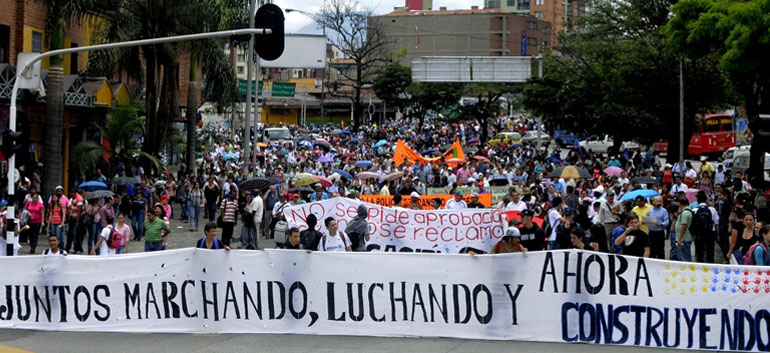An estimated 10,000 workers from various subsections of the health sector took to the streets in Bogota on Tuesday as part of a nationwide protest against the health reform bill recently passed by the Colombian Senate.
MORE: Colombia health reform: The big issues
Elsewhere in the Colombian capital, President Juan Manuel Santos called for the bill to be passed by the House of Representatives with “as much concision as possible,” after meeting with the Ministers of Health and the Interior and various members of the House.
Santos urged the House to take the bill into “urgent” consideration, saying that “the Colombian people are demanding that the [healthcare] sytem improve and that it improve rapidly.”
During seven months of debate in the Colombian Senate, the President and Minister of Health made similar claims, in attempts to speed through a bill opponents said was at best insufficient and at worst actually harmful. Still, opposition leaders in and outside Congress seem to agree with the urgency of the problem — which, among other things, has threatened to financially paralyze many of Colombia’s hospitals in the coming months. But many do not agree with the proposed solution.
The organizers responsible for Tuesday’s protests, which have drawn vocal and organizational support from Tomato Party leaders, include a broad spectrum of healthcare professionals and medical students who believe the President’s health reform legislation will cripple labor in the health sector and deepen the financial insolvency of Colombia’s hospital system.
According to a statement released by the National Association of Interns and Residents (ANIR), the protesters’ central complaints are as follows:
- The reform preserves, and ultimately strengthens, the intermediary payment system by which the government distributes health funding, ceding even more power to the semi-private companies that have embezzled billions of dollars, widely denied treatment to their clients and collectively owe Colombia’s roughly $2.5 billion in uncompensated coverage
- The reform limits the basic public coverage plan afforded to Colombians, continuing a process that began with the partial privatization of healthcare 20 years ago
- The reform gives the President expanded powers to determine contracting policy in the healthcare system, which would worsen a longstanding trend of converting health workers away from permanent employment status toward temporary running contracts which provide no job security and fewer guaranteed benefits
- The reform gives hospitals the power to run specialization programs, as opposed to the medical universities which currently administer them
It should be noted that no detailed proof was provided to corroborate the above claims, although health experts made similar criticisms over the course of the Senate debate.
The National Health Superintendant issued statements claiming that any strikes or walkouts on the part of health workers were illegal violations of the basic rights of Colombians, echoing warnings made this past summer, when hospital workers went on limited indefinite strike.
MORE: Health workers union expects 15000 to join national strikes
But the threats have not stopped some 400 hospitals nationwide from indefinitely suspending their external consultations, or stopped workers from participating in two-hour demonstrations outside hospitals across the country on Tuesday.
As was the case in previous protests, organizers assure they have taken measures to ensure emergency services remain fully operational during the demonstrations, saying that the protests are in defense of those same basic rights, and that efforts will continue until the bill being discussed in the House is removed from the table or dramatically modified.
As of yet, no confrontations have been reported between protesters and public forces, and a spokesman for the Ministry of Labor declined to comment on what, if any, measures will be taken to ensure full hospital functioning.
President Santos indicated Tuesday that he has directed the relevant ministries to meet with congressmen and determine what steps can be taken to address some of the more pressing healthcare concerns, such as the extensive debts owed to hospitals, while the reform bill is being discussed in the House.
Sources
- Presidential press release
- ANIR declaration
- Las razones por que marcha el sector de salud (Semana)
- Presidente pide al congreso celeridad con tramite de reforma de salud (Caracol Radio)
- Hoy medicos marcharan en todo el pais en contra de reforma de salud (Caracol Radio)


